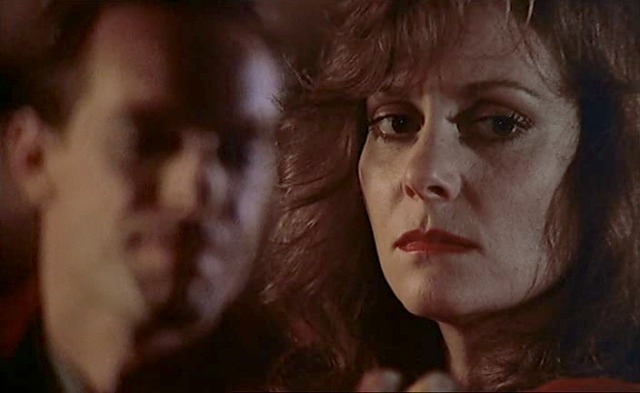Lovely Roses Full Of Thorns: 6 Valentine's Day Movie Alternatives
By Joel Wicklund in Arts & Entertainment on Feb 9, 2015 5:00PM

Lesley Ann Warren and Keith Carradine in "Choose Me." (Image: ©1984 Island Alive)
Are you really going to watch Kate Winslet and Leo DiCaprio run around the deck of the Titanic again? Isn't it time you gave those John Hughes '80s brat pack movies a rest? And haven't you had the time of your life with Dirty Dancing enough for several lifetimes?
O.K., we shouldn't knock anyone's favorite movie romances (even as a someone not on Team Hughes, we're kind of a sucker for Some Kind of Wonderful). And from Casablanca to Say Anything, we also enjoy some of those universal favorites. But it does seem like many of the most popular movie love stories iron the inevitable wrinkles in any relationship to a too-smooth surface that is bound to make real life pale by comparison.
So instead we're offering some Valentine's Day viewing options that are, in one way or another, more complex or at least emotionally trickier than some of those standbys. The terrain is perhaps a little rougher here, but we think all of these films do suggest that if true love doesn't conquer all, at least it's going to put up a damn good fight.
Choose Me (1984): Can two crazy, obsessive, unfaithful, emotional wrecks find happiness together? That's essentially the question in Alan Rudolph's breakthrough film: a neon-lit, neo-noir, silky R&B-scored portrait of unstable people looking to love to save them. With Choose Me, the writer-director broke free of the stylistic branding of his mentor, Robert Altman, and crafted his own highly personal kind of filmmaking. In a career that remains woefully underrated, many of Rudolph's best films (Trouble in Mind, Equinox, Afterglow) would contrast a cynical worldview with a fierce, if very unconventional, romanticism. Choose Me started him on that road and holds up as a one-of-a-kind, terribly twisted, but ultimately weirdly uplifting love story.
Defending Your Life (1991): One of our constant gripes about movie romances is that they often have a troubled soul who gets "fixed" by the perfect partner. But while Albert Brooks' film about romance found in the cosmic waiting room between one life and the next does have that perfect partner character (well played by Meryl Streep), she's specifically there to be an unmatchable role model. It's up to Brooks' character to fix himself as he's put on trial for giving in to fear too often in his previous life. Atypically sentimental for a Brooks film (his Modern Romance might be the ultimate anti-Valentine's Day film), it earns every tug on the heartstrings by addressing one of the most significant life lessons in a truly profound way. It's also extremely funny, with Rip Torn stealing every scene he's in as Brooks' enthusiastic attorney.
The Fly (1986): If Shakespeare can have a romance end in a double suicide, then David Cronenberg's heartbreaking horror tale of a scientist's physical degeneration in front of the woman who loves him also counts as one. Jeff Goldblum and Geena Davis make the cutest damned couple in the world until he becomes ... well, not so cute. As tragic finales to love stories go, it's pretty tough to beat the gut punch when the thing that was once a charmingly nerdy scientist emerges a final time from his teleporting pod and wordlessly asks the love of his life to do one last favor for him.
One Way Passage (1932): From Romeo and Juliet to The Fault in Our Stars, the specter of death hanging over a new romance is a tried-and-true dramatic device. But this beautifully made melodrama really ups the ante. Not only is lovely but frail Joan (Kay Francis) dying of a terminal disease, but her newfound soul mate Dan (William Powell) is headed to prison where he faces execution for murder! The plot contrivances aren’t what matter here though. What makes this essential viewing is the way director Tay Garnett visually captures both the romantic haze of his characters and the grim melancholy that intrudes upon it. The camera moves a lot for an early sound film, and sometimes spectacularly so.
The Spectacular Now (2013): This is kind of the hard-edged version of Say Anything: the happy-go-lucky kid (Miles Teller) here is also an alcoholic while the brainy girl (Shailene Woodley) is desperately in need of someone to get her to come out of her shell. Though there are some formulaic aspects to the movie, enough of it feels real and deeply felt to overcome them. Teller and Woodley are terrific together and an unexpectedly strong performance from Kyle Chandler as Teller's fully dysfunctional father adds a level of rough realism, so the movie earns its sentimental moments.
Waking the Dead (2000): You could call this the thinking man's Ghost, though the spirit here could be entirely in the mind of the bereaved. A rising young politician (Billy Crudup) begins to see the woman he loved deeply (Jennifer Connelly) reappear, despite the fact that she was killed in a car bombing. If this sounds like a terribly depressing set-up for a romance, the flashbacks to their budding relationship grace the film with a deep warmth, albeit floating upon a very sad surface. The film is also very much about ideological differences (Connelly's character is a liberal activist) and how a young love lost can mirror fading idealism.